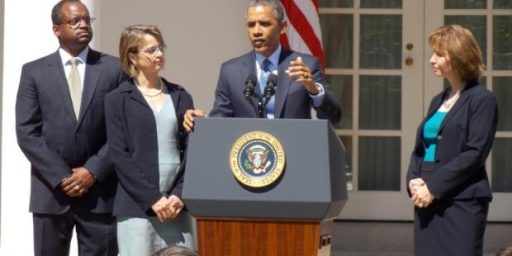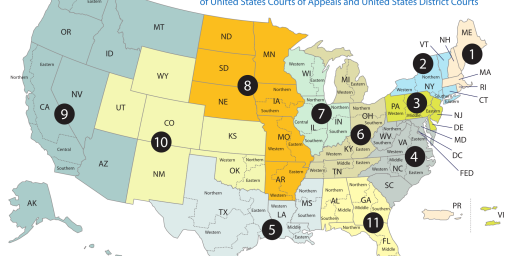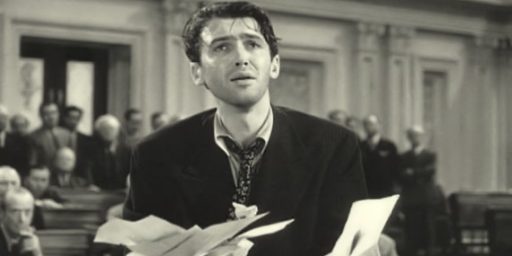The Filibuster And Judicial Nominations
The Judicial Confirmation process needs to be fixed.
Late yesterday, the Obama Administration formally withdrew the nomination of Caitlin Halligan to the Court of Appeals for the District of Columbia Circuit after her nomination failed for a second time to make it past a Republican filibuster:
Caitlin Halligan, President Obama’s best hope for a Democratic appointee to the crucial federal appeals court in Washington, withdrew her name from consideration late Friday, handing a victory to Senate Republicans committed to keeping her off the bench.
In the extended, ongoing skirmish over federal judges, the D.C. Circuit, as it is known, is a slice of territory second only to the Supreme Court in terms of its importance to both sides. The court routinely issues rulings that interpret federal regulations and has long been viewed as an on-ramp to the high court. (Chief Justice John Roberts, for one, is an alumnus.)
Indeed, concerns about judges on that court ascending to the next level are what led Democrats a decade ago to filibuster Miguel Estrada, a prominent D.C. lawyer who remains in line to be the nation’s second Latino justice. The filibuster of Halligan at the hands of Senate Minority Leader Mitch McConnell and his caucus can only be considered payback in a conflict that shows no sign of abating despite talk this year of filibuster reform.
Halligan, who spurned a high-paying corporate-law job in favor of advising the district attorney in Manhattan and who served as a top advocate in New York state government, sent a letter to Obama informing him of her decision to withdraw in the face of GOP opposition.
“I am deeply disappointed that even after nearly two and a half years, a minority of senators continued to block a simple up-or-down vote on her nomination,” Obama said Friday in a statement. “This unjustified filibuster obstructed the majority of senators from expressing their support. I am confident that with Caitlin’s impressive qualifications and reputation, she would have served with distinction.”
Halligan joins Goodwin Liu, a rising liberal star in legal ranks, as potential federal judges who were successfully kept from the bench by the GOP. Liu, who was a favorite of liberal interest groups, was viewed by many as potentially the first Asian-American Supreme Court justice. He now serves on the state Supreme Court in California.
(…)
In his four years plus as president, Obama has been unable to fill any of the four vacancies on the D.C. appeals court. Halligan, 46, was first nominated to the court in 2010 (to replace Roberts five years after his departure), but Senate Majority Leader Harry Reid has been unable to secure 60 votes for her confirmation in a series of cloture votes since, largely because of opposition from the National Rifle Association, which has contended Halligan is hostile to gun rights.
As James Joyner noted when he wrote about this issue earlier this month, there doesn’t seem to be any solution to the problem at the present time. The D.C. Circuit is, as noted above, seen as a stepping stone to the Supreme Court and has been for quite a long time. Of the current members of the Court, four members were elevated to their current position from the D.C. Circuit (Roberts, Scalia, Thomas, Ginsburg), more than any other lower-level Court in the nation. Additionally, because it is located in Washington the D.C. Circuit is often the Court from which important decisions regarding disputes between Congress and the President and disputes over the actions of Cabinet Departments and Regulatory Agencies are heard. Therefore, it’s not surprising that nominees to this particular court would get more scrutiny.
At the same time, though, it’s worth noting that the D.C. Circuit Court of Appeals is not the only Court where there are vacant judicial seats that, for one reason or another that have not been filled. According to this information provided by the official website of the Federal Courts, there are currently 16 separate vacancies for Court of Appeals positions spread throughout the country and 69 vacancies among the Federal District Courts, the trial courts where the vast majority of federal litigation both civil and criminal takes place. As a practical matter, what these vacancies mean is that a large amount of the work that the Federal Courts have to do on a daily basis is getting done at a far slower pace than it would otherwise. To some extent, some of the work that would be getting done by the judges who have not been confirmed, or in some cases even nominated yet, is being covered by judges who have retired and have taken Senior Status, but the numbers of those judges available by no means makes up for the the number of vacancies. The result is delays and backlogs in the processing of cases, mostly to the detriment of civil litigants since criminal cases get priority. (Of course, delays aren’t anything new in Federal Courts, about 15 years ago it took a Federal Judge a year to rule on a Motion to Dismiss I had filed. I won, but the delay was still annoying.) With specific regard to the D.C. Circuit, it means that important cases involving matters of Federal law are often delayed longer than they ought to be simply because of the lack of sufficient judges.
The role of the United States Senate when it comes to judicial nominations is, at least as it’s set forth in the Constitution, really quite simple. Under Article II Section II, the Senate is charged with giving its “advice and consent” to the President’s nominations of judicial officers. It’s the same power that the Senate has with respect to Ambassadorial appointments, Cabinet appointments, and certain military promotions. It strikes me, though, that there is something distinctly different about judicial nominations that differentiate them from those other positions requiring Senate confirmation. Specifically, it’s the fact that the Judiciary is the only branch of government that depends upon another branch of government for the appointment of its personnel. If the Senate decided to be obstructionist, it could prevent a President from confirming any judicial nominees, at which point the Judicial Branch is operating at the mercy of a small faction in the Senate.
This isn’t the first time we’ve seen Senators obstruct a President trying to get judges appointed, of course. Something very similar happened during the Bush Administration and threatened to turn into a true Constitutional crisis but for the intervention of a bipartisan group that came to be called the “Gang of 14.” Until this group was able to hammer out a deal that allowed the vast majority of Bush’s judicial appointees come to a vote, there was talk among some Senate Republicans about challenging the Democratic efforts to filibuster judicial nominations. Some argued at the time that applying the filibuster to judicial nominations was unconstitutional. Others pushed then Senate Majority Leader Bill Frist to pull off the so-called “nuclear option” and use the power of the majority to amend the filibuster rules. Whichever course the GOP might have chosen at a deal not been made, there’s no doubt that it would have been a big political and Constitutional mess.
We didn’t have this problem with judicial confirmations in the past. Indeed, up until LBJ tried to get his drinking buddy Abe Fortas elevated to Chief Justice, it was incredibly rare for a President’s choice for any judicial post to be rejected by the Senate. Since then, though, and especially in the hyperpartisan atmosphere that we’ve seen develop over the past two decades or so, it’s become a far more common occurrence and the impact on the judicial system has become more and more apparent. The question is, what can we do about it?d Str
I suppose we can hope that the days of hyperpartisanship will end, but we may as well also hope that a team of unicorns will be coming down Constitution Avenue driving a carriage holding the pots of gold at the end of every rainbow.Instead, I think that we need to look at reforming the way the Senate handles judicial nominations. In his post earlier this month that I made note of before, James Joyner suggested that the number of votes needed to invoke cloture for judicial nominations should be lowered, perhaps to something around 55 rather than the normal level of 60. Outside of completely eliminating the filibuster for such nominations, which I don’t think would make it through the Senate, this strikes me as a reasonable proposal. It gives the minority an opportunity to have a voice, while at the same time acknowledging that Judicial Nominations are far more important than, say, that bill to name the Post Office on the corner of 3rd & Maine in Outtumwa, Iowa.







As the minority party the Republicans are using everything in their power to obstruct the majority will of the Democrats.
…I get this, even though the plight of Americans seems to be a non issue with our “leaders”.
…However, it is up to the majority to use all of the power at ITS disposal to reach the agenda upon which they ran and on which they were elected.
…C’mon Harry, you are in a war. Use the power you have been given by the majority of Americans. Enough excuses.
There will probably be two openings in the SCOTUS and I predict they will go unfilled. If the Democrats win in 2016 the Republicans will do the same thing. If the Republicans win the Democrats will remember.
The judicial nomination process needs to be fixed.
ZZZzzzzz
It ain’t gonna git fixed as long as we have a two party system and there is divided government. I don’t remember any Dems crying about fixing the judicial nomination process when they controlled Congress and Obama was POTUS—do you?
Of course the “process” is broken, but so what? If political parties REALLY wanted to fix it, they would do it when they had complete control of govenment—and the “process”, which ain’t happened yet and ain’t gonna happen soon.
Doug, you blame LBJ for Abe Fortas’ nomination for the gridlock, but until Robert Bork was, well Borked by Ted Kennedy and other leftwingers, it all was pretty collegial.
Since Bork, it has been all out war. Thanks Dems for polarizing the “process”.Hope you’re happy—you got what you wanted.
@Ron Beasley: It won’t matter if the Democrats “remember”. Anybody who thinks for one second that the Republicans won’t kill the filibuster deader than dead the moment they get 50 Senate seats and the White House at the same time is just kidding themselves. Harry Reid got played big time this past January.
Bork was an extremist though, I honestly can’t think of a Democratic equivalent to nominating a man who viewed the 1964 CRA as legislative overreach, and given the bald- faced lies told by Rehnquist when he was pushed up to Chief Justice earlier that decade the Reagan admin should have expected higher scrutiny to be applied to its SC nominees.
If 2 slots come open this term I think GOP onstructionism will depend on which slots are open- if it’s Breyer and Ginsberg, they might let slightly liberal nominees go through of a Scalia or a Thomas need to be replaced all bets are off. The only real answer is all out obstructionism during the next GOP administration– barring that Republicans have no downside, lock the court when a Dem is in office, make a deal when you have appointment power.
As a foreigner I am not sure I understand the US legal system correctly, but in the truly important questions I don’t think lower court opinions matter because they can be invalidated by the Supreme Court. Could a potential compromise be to abolish the filibuster for all judicial nominations except for the Supreme Court, which instead gets a new “ordinary” vote threshold of 66 Senators, like a treaty ratification?
@Ron Beasley:
I doubt if the Republicans can take the heat of filibustering a Supreme Court Justice. On the other hand, The Democrats are just one vote away from having a Supreme Court that will do away with limits on gun laws, speech codes, or anything that would control the power and scope of the federal government.
Maybe the long term problem is that justices should serve for a limited term (would take a constitutional amendment) to limit the damage that a judge can do. The Republicans have to be afraid of having very liberal judges being for the bench 30 years or more. Of course, the Democrats do not have the same concern because the longer a judge is on the bench, the more to the left the judge will drift.
@SoWhat:
Except, of course, that it hasn’t. Most of the SCOTUS nominations since Bork have not been contentious (the only exception being Thomas). Beyond that, this utter obstruction did not start immediately after Bork–it is a far more recent phenomenon.
@Todd:
Without a doubt, the last time the GOP held 60% of the seats in the Senate was during the 67th Congress. That’s 1921-23….
Doug, part of the problem as that the “vacant” seats are not necessarily vacant. Judges taking senior status can and do still work full time, though the seat is now open for Presidential appointment. I know locally we have over-filled district seats where a full time judge sits with one or more senior status judges, whom appear intent on working substantially until they die or are forced out somehow.
The D.C. Circuit has four vacancies; six judges on senior status, and Obama has only nominated someone for two of the vacancies, though one just opened up this year.
@Tran: What most Americans don’t understand is how much the majority wants super-majority votes like the filibuster as a means of preventing difficult votes that might cost an election.
IMHO, the filibusterer of Caitlin Halligan is an example of this. She has promoted fairly extreme anti-gun policies from the perspective of parts of the country that are reliably pro-gun. The Republicans would likely have eventually caved and gave her a vote closer to the 2014 Senate elections, when about 6-7 vulnerable Democratic seats would be up for election, and a vote for Halligan would be politicized as a radical anti-gun vote. (She only got 51 votes to break the fillibuster; its not even clear to me that she would have gotten the votes to get the seat) Thus, the fillibuster protected the Senate Democrat;s vulnerable flank from a decision that could have cost them control of the Senate — and they get to blame the Republicans for disrupting democracy.
@PD Shaw:
Why nominate more when Republicans refuse to give a vote on those already nominated?
Why would a judge want to be nominated when he/she already knows that the nomination will be held up for ages until it is withdrawn?
Is having your nomination withdrawn due to Republican obstruction good or bad for a judge’s career?
Bork wasn’t even filibustered.
@PJ: Who said anything about needing 60 seats? The filibuster quite obviously needs to be reformed. For some reason the Democrats are reluctant to pull the trigger. But let’s be honest, if the November election had turned out differently and we now had a President Romney and Majority Leader McConnell, do you really think they’d let the Democrats get away with filibustering anything? … like say an Obamacare repeal bill. Those rules would have been changed at the start of the session without even a hint of shame.
@RobZ:
Indeed, and he never should have been nominated but the GOP has no shame in such things. They’ll refuse to mention the name Nixon but happily nominate his co-conspirator to the highest court in the land.